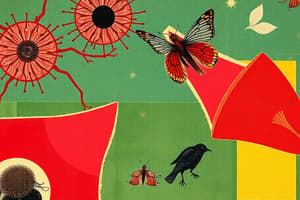Podcast
Questions and Answers
What is the main purpose of the circulatory system in the body?
What is the main purpose of the circulatory system in the body?
- Regulating body temperature
- Producing urine
- Releasing salt
- Delivering nutrients to tissues (correct)
Which organ is NOT directly involved in excretion?
Which organ is NOT directly involved in excretion?
- Lungs
- Liver
- Heart (correct)
- Skin
What is the main purpose of excretion?
What is the main purpose of excretion?
- Delivering nutrients
- Building complex biological compounds
- Removing waste products (correct)
- Regulating body temperature
Which process involves an increase in size, mass, and complexity over time?
Which process involves an increase in size, mass, and complexity over time?
Which system is responsible for transporting materials throughout the body?
Which system is responsible for transporting materials throughout the body?
What is the significance of nutrition in sustaining life?
What is the significance of nutrition in sustaining life?
What is the primary purpose of respiration in living organisms?
What is the primary purpose of respiration in living organisms?
During which type of respiration does gas exchange happen through specialized structures like lungs or gills?
During which type of respiration does gas exchange happen through specialized structures like lungs or gills?
What are the three main categories of nutrients required by organisms for proper function?
What are the three main categories of nutrients required by organisms for proper function?
Which trace element is NOT mentioned as a nutrient required by organisms?
Which trace element is NOT mentioned as a nutrient required by organisms?
Growth and development are essential life processes because they:
Growth and development are essential life processes because they:
What is the role of hemoglobin or myoglobin in the process of respiration?
What is the role of hemoglobin or myoglobin in the process of respiration?
Study Notes
Life Processes: Understanding Respiration, Nutrition, Circulation, Excretion, Growth, and Development
Life is filled with countless intricate interactions between cells and systems within living organisms. To survive, grow, and function properly, various life processes work harmoniously to sustain homeostasis—a state of balance essential for maintaining optimal health. In this exploration, we'll dive into several vital aspects of life processes including respiration, nutrition, circulation, excretion, growth, and development.
Respiration
Respiration involves converting the chemical energy stored in organic molecules into usable forms like ATP—the molecular currency of cellular energy. Organisms carry out two primary types of respiration: cellular respiration takes place in cells, while external respiration occurs outside cells, where gas exchange happens through specialized structures such as lungs or gills. During these processes, oxygen binds to proteins called hemoglobin or myoglobin and is used to produce carbon dioxide and water as waste products, which must subsequently be removed from the body.
Nutrition
Nutrition refers to the process by which an organism acquires food and uses it to maintain its physical condition, support growth, and repair damage. Organisms require nutrients found in three main categories: carbohydrates, fats, and proteins. Additionally, they need vitamins, minerals, and trace elements like iron, zinc, calcium, potassium, and sodium. Food provides energy (measured in calories) to fuel our bodies along with building blocks required for constructing complex biological compounds needed for survival and reproduction.
Circulation
Circulatory systems consist of organs and blood vessels responsible for transporting materials throughout the body. Blood serves as the medium for delivering nutrients to tissues, removing wastes, regulating body temperature, and maintaining acid-base balance. For example, warm-blooded animals have closed circulatory systems consisting of the heart, arteries, veins, and capillaries. These systems work together to ensure efficient distribution and retrieval of necessary components among all parts of the body.
Excretion
Excretion is the removal of waste products and excess materials generated during metabolic activities. Organs involved in excretion include kidneys, liver, skin, and lungs. Kidney filtration produces urine containing excess nitrogenous waste products that eventually leave the body via the ureters. Meanwhile, sweat produced by skin helps cool down body temperature and release salt; lungs eliminate carbon dioxide during external respiration. Waste management plays a significant role in preventing toxic buildup and preserving overall homeostasis.
Growth and Development
Growth represents an increase in size, mass, and complexity over time. Cells divide, differentiate, and mature to form new body structures and tissue systems. Development signifies how an organism goes from a simple to more advanced stage during its lifecycle. Factors influencing growth and development include genetics, hormones, dietary intake, environmental conditions, and aging. Without proper growth and development, organisms cannot achieve their full potential nor thrive in their natural environments.
In conclusion, understanding life processes requires exploring diverse facets of biology, including respiration, nutrition, circulation, excretion, and growth and development. Each process builds upon the other and contributes significantly towards sustaining life at every level—from single cells to entire ecosystems.
Studying That Suits You
Use AI to generate personalized quizzes and flashcards to suit your learning preferences.
Description
Explore the intricate interactions and vital aspects of life processes such as respiration, nutrition, circulation, excretion, growth, and development in living organisms. Learn how these processes work harmoniously to sustain balance and optimal health at various levels.



